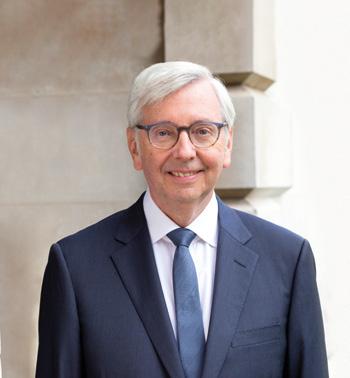04
Foreword Vice-Chancellor Professor Stephen J Toope introduces a special focus on COVID-19 research. Image Machines developed by a Cambridge University spinout being used to diagnose infection with SARS-CoV-2 at Cambridge University Hospitals NHS Foundation Trust
To remark that the past year has been unusual is an understatement. Things that seemed unimaginable this time last year – the clear and present risk to public health, the shutting down of our institutions, the cutting off of our social contacts – were, quite suddenly, the new pattern of our lives. It fills me with enormous gratitude that, at the moment of greatest challenge, our community rallied and rose to the occasion. Colleagues across the collegiate University worked tirelessly to modify teaching and assessments, develop new systems for business-critical activities, manage the closing and reopening of buildings, and put together public health measures to keep everyone as safe as possible. Meanwhile our researchers jumped into action. Dozens of new research projects began on the nature and transmission of the SARS-CoV-2 virus, on finding therapeutics and a vaccine, and on understanding the impact of anything from mental health to social behaviour. Work had already started on this edition of Horizons when the national lockdown was announced in March. The enforced pause offered an opportunity to rethink its contents to highlight some of Cambridge’s extraordinary contributions to tackling the COVID-19 crisis. The projects highlighted here are the tip of the research iceberg. You will read of how one of our newest institutes – the
Cambridge Institute of Therapeutic Immunology and Infectious Disease – pivoted almost the entirety of its research towards studying, treating and testing for COVID-19. And of how the University and nearby Wellcome Sanger Institute are leading the COVID-19 Genomic UK (COG-UK) Consortium, a major national effort to deliver largescale and rapid whole-genome sequencing of the virus to guide UK public health interventions. Others focused on NHS capacity, and on the logistics and supply chains for frontline resources like personal protective equipment. An award-winning, low-cost, open-source ventilator was designed for use in low-income countries by a team from the Department of Engineering’s Whittle Laboratory, working with colleagues from the Institute for Manufacturing and in collaboration with a manufacturer in South Africa. A large number of research projects have also begun on post-COVID recovery, including studies on the economic impact of the pandemic on social and educational equality and, vitally, on how we can prevent future pandemics. And there is so much more – again and again we’ve seen researchers across the disciplines contribute their time and expertise at this challenging time. We often remark on the University of Cambridge’s mission: to contribute to society through education, learning and research. I cannot think of a more
powerful contribution to society than Cambridge’s response to this global health emergency. As this issue of Horizons was being completed, we learned with deep sadness of the sudden death of our colleague Professor Chris Abell. As Pro-Vice-Chancellor for Research since 2016, Chris helped to coordinate and support the University’s research endeavour, the results of which have regularly been reviewed in this magazine. He was instrumental in coordinating the University’s response to the national need for COVID-19 testing. Much of what is covered in this special issue was made possible, in some way, thanks to his personal efforts. He will be missed by all of us.

